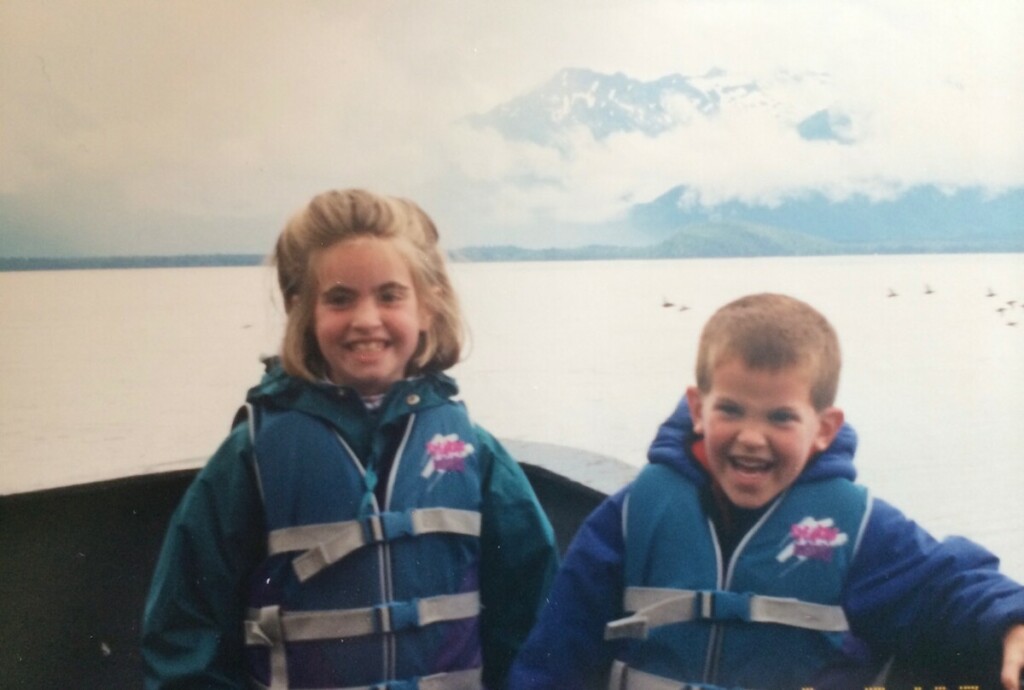Jenny Gore Dwyer on Motherhood in the ’90s
I feel like Jenny is one of the matriarchs of our community. Over the years, Jenny has shared such intimate and touching stories with her fisherman and family with words soaked in love and understanding. It’s the writer in Jenny that beautifully translates the emotions of a fisherman’s wife and the mother in her that delivers stories like a warm hug.
So, you can imagine how TRILLED I was that Jenny would further share insights on motherhood, and I know you will feel the same after reading this interview. See how Jenny navigated this challenging lifestyle before technology – with an entirely new set of trials in the mix! Through Jenny’s wisdom, I hope there are takeaways that will make you feel seen and less alone for the incredible women and mothers that you are. (We love our POCF mamas, and we are here for you!)
Without further ado, here is one of our favorite Partners of a Commercial Fisherman, Jenny Gore Dwyer!
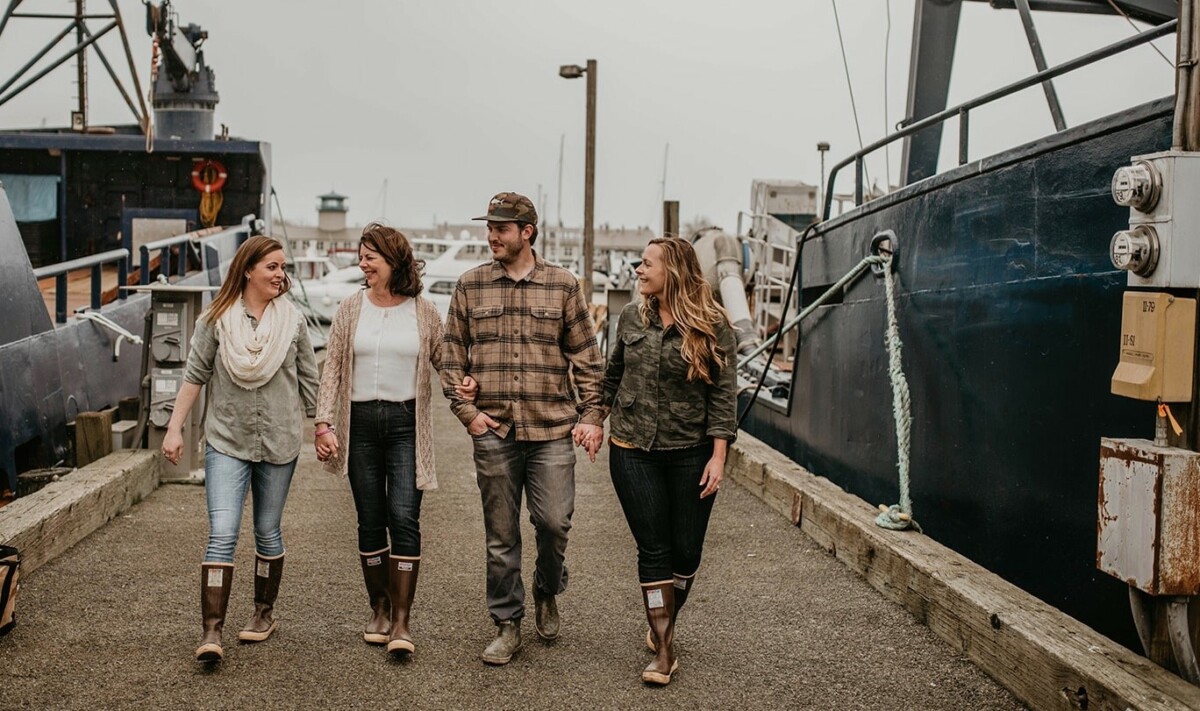
What’s your name, where are you from, and who are the members of your family (plus the ages of the kids)?
My name is Jenny Gore Dwyer. I was born and raised in Ketchikan, Alaska, but live in Seattle, Washington, now.
The members of my immediate family are my daughter Brenna (age 33), my son Sean (age 31), my daughter-in-law Bri Dwyer (age 33), and my darling granddaughter Blakely Jade (18 months).
My husband, Pat, passed away 10 years ago from ALS. But he is forever in our hearts.
Where did your fisherman fish, what kind of seafood, and how long was he gone at a time?
When we bought our first boat in 1986, we did the herring and salmon tender circuit. It was a 6-month season. We left Seattle in March and followed the herring fishery up the coast of Alaska. We tendered in Kah Shakes, Sitka, Prince William Sound, Togiak, Goodnews Bay, Nelson/Nunavak Island, Unalakleet, and Nome….and I’m sure other places in between!
After Herring was done in May, we made our way back down to Bristol Bay or Prince William Sound and tendered salmon for the summer. It was a busy, fun, and sometimes scary time. But we loved every minute of it.
In the beginning, we had our daughter Brenna on the boat with us most of the time. Her boat life beginning was a little delayed as I was pregnant with her the year Exxon Valdez happened. We were headed to tender herring in Prince William Sound when the accident occurred. When we stopped in Seward to gear up, we decided I shouldn’t be on the boat as they headed to PWS. So I got off for the rest of the season.
Once we had our son Sean, I stayed home with the kids, and Pat left for the 6-month circuit. My first time home alone with two kids – Brenna was 2.5 yrs old, and Sean was 12 days old.
All of a sudden, the world seemed very big and very small at the same time.
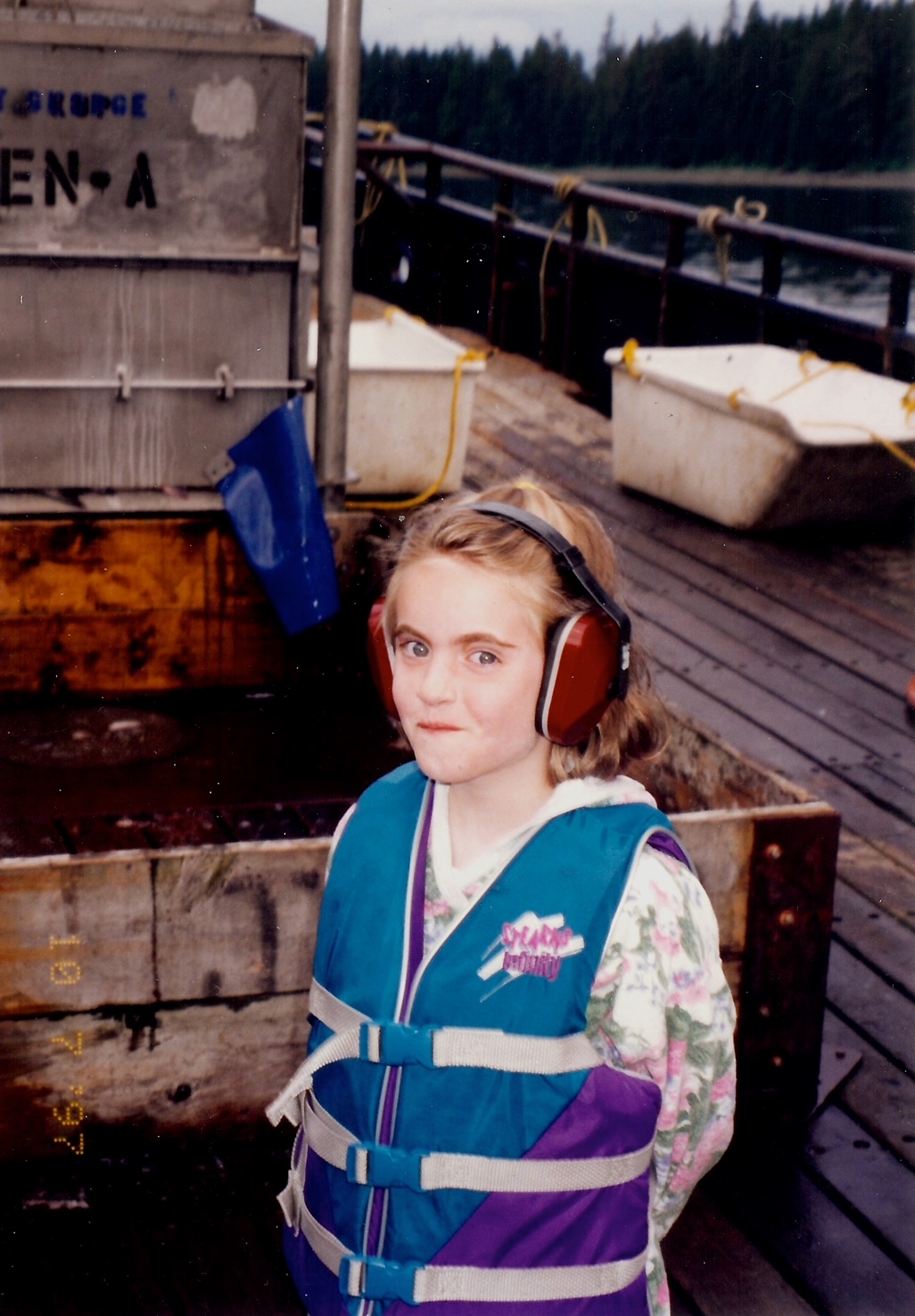
Please describe the conversations you had with your spouse prior to fishing in regard to supporting you and your children. (I.e., did you and your fishermen discuss your role as a POCF mama before/after you got together? What were the expectations like?)
Honestly, we didn’t have any conversations.
It was just intuitive that I knew he was in charge of boat stuff, and he knew that I was in charge of kid/home stuff. We both just did what we needed to do. There weren’t any rules or expectations. Most of the time, we were just flying by the seat of our pants. Trying to make the best decisions we could.
We were 24 and 25 when we bought our first boat…25 and 26 when we got married. Brenna was born when I was 28, and Sean when I was 30. The only expectations that we had, I don’t know that I’d really call them expectations, was that I would be home with the kids. Pat would be on the boat, and we both just did whatever needed to get done to make it work.
There was not a lot of talking about supporting me and the kids. There was just a bunch of doing and hoping for the best! Mostly like keeping the kids alive and paying the bills…and trying not to worry about Pat too much.
What was the adjustment like for you personally when your fisherman left? For the kids?
For me, it was hard. I mean, most of it was a blur because I was just so busy. There were moments of tears and frustration and questioning, “how am I going to make it through this?” But after about 3 weeks, I found my groove, and it was just life. It was the choice we had made together as a couple, so it was what it was.
But I think I had the best motivating factor – to not spend too much time dwelling on the “hard” of Pat being gone (and more time on) Brenna and Sean. It was the smiles, the giggles, and the simple times of reading stories at night that kept me sane.
Don’t get me wrong; there were also times of yelling, crying, and pouting. But every day was a new day, so we’d just wake up and try again.
As far as the kids adjusting, they were so young. I never really noticed any behavior problems related to Pat being away. Or if there were, I figured they were just normal toddler/baby problems. The one thing I will say is that kids are resilient and strong. Sometimes they were my strength when I needed support and Pat was gone.
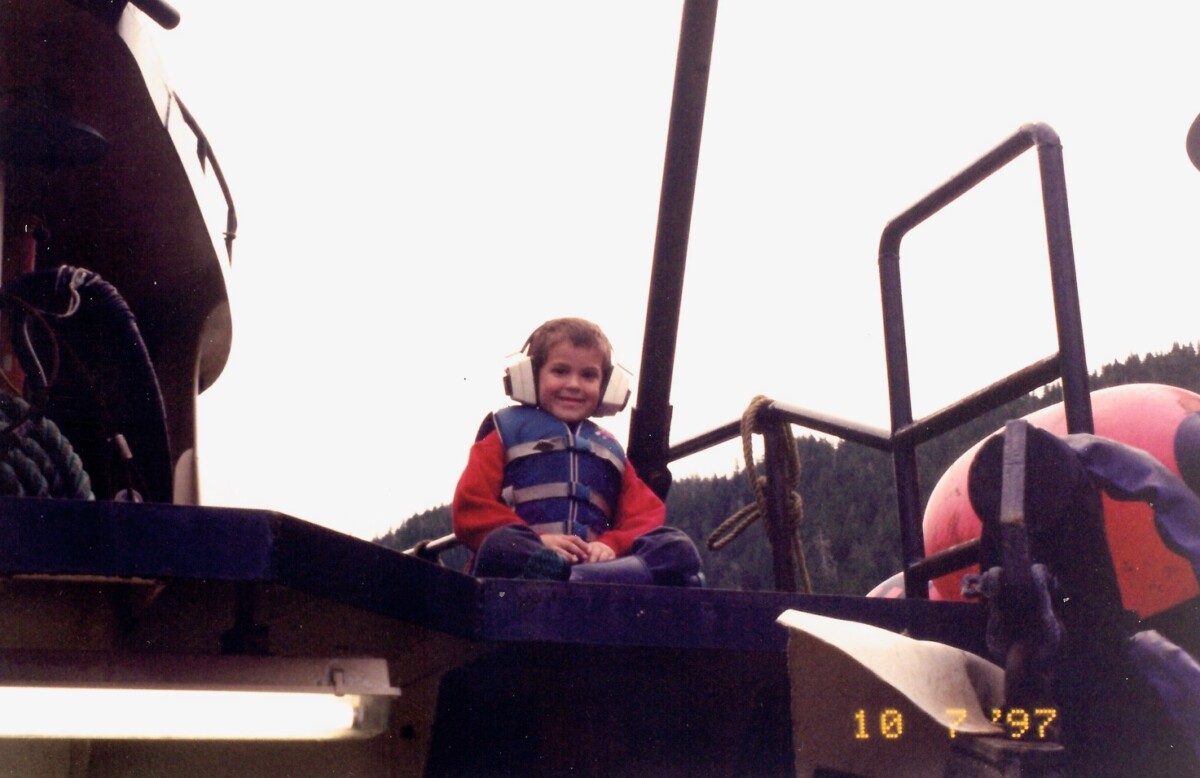
What were ways you and your children were able to stay connected to your fisherman during a season?
Welllll, back in the “olden days” of communicating – like back in the 1990s – it was letters, cards, Marine Operator, and a single side band radio we had in the downstairs of our house! I took pictures on a Kodak camera, took them to Kenmore Camera to have them developed, then mailed them to Pat.
I would also send along pages from coloring books that Brenna had colored and pieces of paper that I helped Sean scribble on. It was his wall art for his stateroom!
When Sean and Brenna worked on the boats as older adults, as a mom, I was thankful for the technology that is now available for staying in touch. Texting, camera phones, and satellite communications made such a huge difference in my level of worry, knowing I could be connected to them at almost any time. I’m not sure if the feeling was mutual, though, as the mom texts flew daily!
Please describe the transition back home. Did you do anything to prepare yourself and/or your children? Were there any challenges?
The transition home was tough as well. I’d been in charge of everything at home while Pat was gone. I just did things, didn’t really ask anyone about it, and tried to do the best I could. Then, Pat would come home. All of a sudden, there would be questions like, “Why did you do that?” or “How come you didn’t do it that way?” Or the super annoying questions like, “When is dinner going to be ready?”
It was hard to have someone come in and make you feel like you didn’t do everything right while they were gone. But what I tried to remember was that he, too, was making his own adjustments.
He was transitioning from being a captain on a boat, in charge of a crew and their safety and livelihood. He went from being the boss of it all to trying to come home and be a dad and a husband…where he wasn’t in charge of it all.
However, after about three weeks, we figured things out, and the days found a new rhythm with two parents at home. It was challenging, but always worth it at the end when we would dance the Macarena as a family together at night. (I’m dating myself here!)
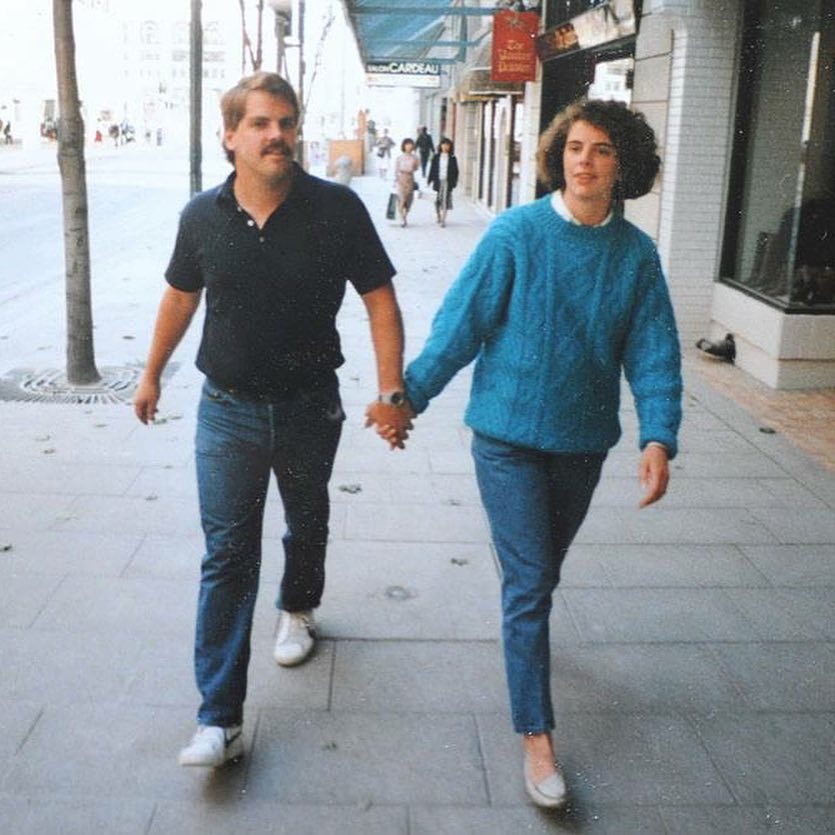
Please share a fond memory of your fisherman returning home.
Whenever I could, I would take the kids down to the Ballard Locks to watch the boats come back home from Alaska. To this day, I still try to make it to the Locks any time our boats are leaving to or coming from Alaska.
But perhaps my most fond memories of Pat returning home are when he would be flying home from Alaska. The kids and I would head out to the airport to pick him up. We’d always leave a little earlier than needed. The kids loved riding on the trains at the Seattle Tacoma airport. They would always ask, “Will we have to ride the train to meet dad?” We never knew what gate he would be at so I’d answer, “I don’t know, but we can go early and ride them anyway!” We’d get to the airport, find out where Pat would be landing, and if it wasn’t at one of the satellite gates that you had to ride the train to, we’d spend about 15-20 minutes riding the train.
When the train first starts up, there is a jerking motion, and the kids would always try not to hang on to a handrail and try not to fall! Or they would sit, looking out the front window (we always tried to get in the front train), watching the train go through the dark gray tunnel. Everyone was always in such a good mood by the time we met Pat. It was a great homecoming.
Of course, this was back in the day when you could still go to the airport gates and meet your person!
One of my other fond memories is making Pat his favorite dinner that first night. Or, we’d go to our favorite restaurant, the “Italian Spaghetti House.” I wanted to make it a big deal that Pat was home, and it was a time to celebrate.
What advice or tips would you like to share? What activities or mindsets have been more helpful for you?
If I have learned anything in life, it’s been that when you are in big heavy hard situations, you make the best decision you can with what you are facing or living in right at the moment. I’ve found that my gut and heart guide me.
Of course, you can always look back at things and say, “I should have done that, or I could have done that differently.” It’s easy to judge and question after the fact. But just be confident in the moment. Go with your instincts.
Most of the time, things will work out. The times that don’t, you learn from it. It might be messy as it works out, but that is part of the learning.
Fishing and being a partner to a fisherman is not easy. It’s hard for all involved. When you are the one home, you are everything. Plus, there is the added worry about the work that your partner is doing. When you are the person on the boat, you are everything. Melding those two worlds together after a season away can sometimes be not so “happily ever after.”
But trust your gut, trust your person, and trust your love.
Respect your person’s gut, respect your person’s trust, and respect your partner’s love.
If you truly have love at your core…you win at all the hard stuff. 🐟
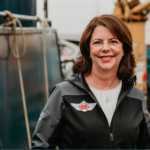 Jennifer Gore Dwyer is the President of St. George Marine, a Board Member of ALS Therapy Development Institute, and the author of Crabby Mama.
Jennifer Gore Dwyer is the President of St. George Marine, a Board Member of ALS Therapy Development Institute, and the author of Crabby Mama.
What aspects of Jenny’s experience speak to you or make you feel less alone? Please share in the comments below!
Click below to dance with the Dwyers! (We love you, Jenny! 🙂 )
To read some of Jenny’s previous stories, check out, Meet Jenny Gore Dwyer of Deadliest Catch &, “Two Boats” Guest Post by POCF Jenny Gore Dwyer
